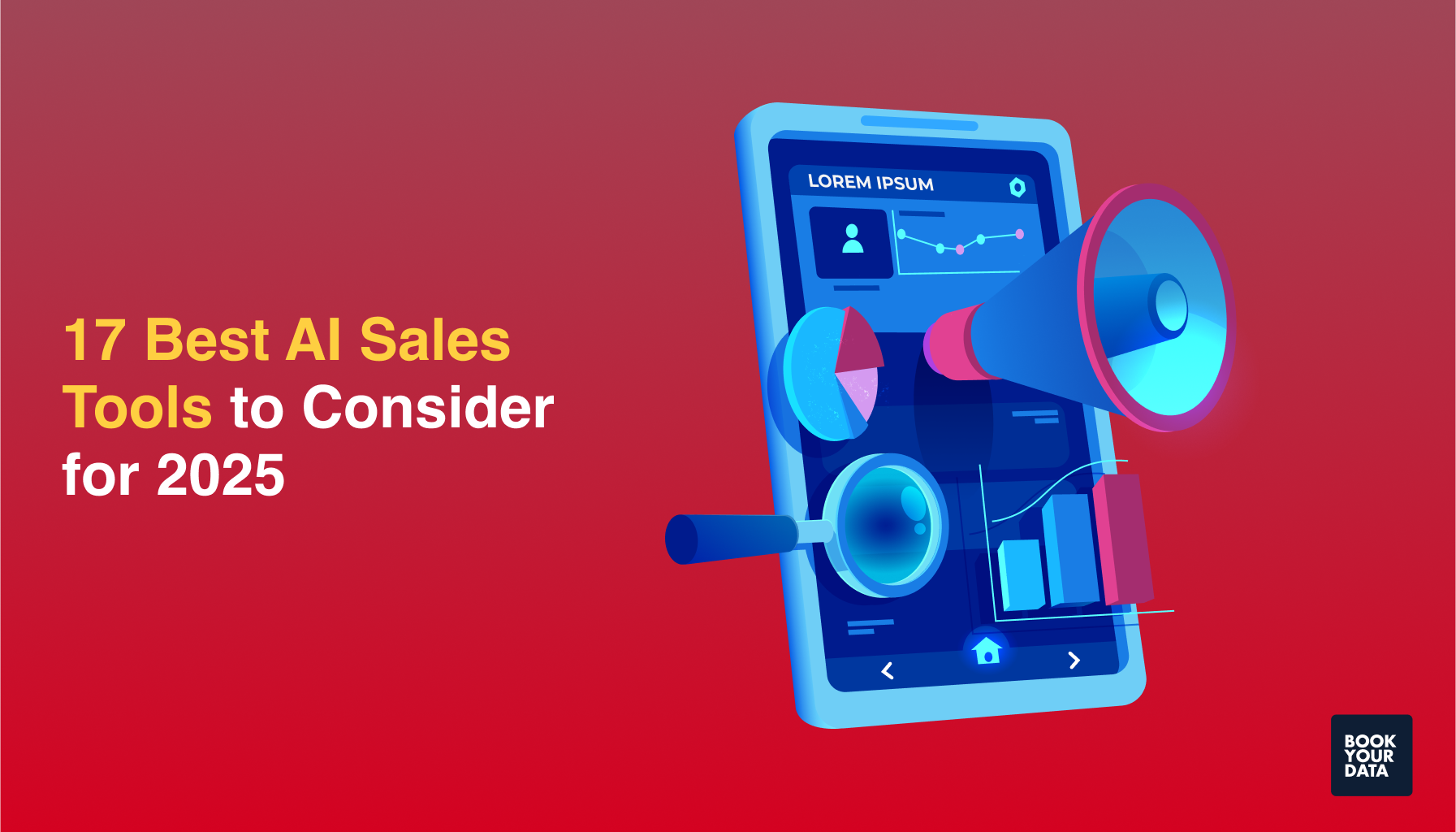ZoomInfo vs RocketReach: Definitions, Features, Similarities, and Differences
ZoomInfo is a GTM (Go-to Market) intelligence platform that helps sales teams find their ideal buyers and customize their messaging to close leads. RocketReach is a lead intelligence platform that helps businesses close deals faster and hire top talent.
ZoomInfo provides businesses with the ability to build contact lists, maintain data accuracy, automate sales processes, enrich data, integrate with CRMs, access an extensive contact database, gain AI-powered insights, and implement automated workflows. RocketReach allows businesses to perform company research and provides a Chrome extension for LinkedIn and websites, advanced search filters, bulk contact lookup, API access, CRM integrations, data export, email verification, usage analytics, and GDPR Compliance.
The similarities between ZoomInfo and RocketReach are that both are B2B lead generation platforms and offer extensive contact databases, email and phone number lookups, API access for custom workflows, and support Chrome extensions for LinkedIn and websites.
ZoomInfo and RocketReach differ in terms of pricing, data accuracy, integrations, data depth, use cases, search capabilities, and user experience.
ZoomInfo vs RocketReach comparison
Here is a comparison table of ZoomInfo vs RocketReach to help you understand how their features, such as database, list enhancements, and ease of use, differ from each other.
What is ZoomInfo?

ZoomInfo is the GTM (Go-to-Market) intelligence platform that gives businesses high-quality B2B data and sales intelligence to maximize revenue growth. The platform offers a search tool that provides detailed contact and business information about individuals, companies, and other business entities. ZoomInfo collects data from various sources, such as the internet and third-party integrations, to maintain up-to-date profiles for lead generation, sales prospecting, marketing outreach, and talent acquisition. This B2B prospecting tool uses artificial intelligence to provide accurate, real-time insights and automation capabilities, and to improve business development efforts.
How does ZoomInfo work?
ZoomInfo works by collecting extensive business-to-business (B2B) data from a wide range of sources, such as the internet and other proprietary means. It also uses a combination of advanced technology and human verification to provide accuracy and compliance. This B2B platform uses proprietary web crawlers to scan publicly available data across millions of websites, such as company websites, professional profiles, job postings, news articles, press releases, and government filings. ZoomInfo improves its data quality through artificial intelligence and machine learning algorithms that verify, clean, and fill in gaps across the data it collects. ZoomInfo has a dedicated team of researchers who perform human verification to maintain high data accuracy.
What is RocketReach?

RocketReach is a phone and email finder tool that allows decision makers to improve their outreach process with AI-powered recommendations and grow their pipeline automatically. This B2B data provider gives users access to a database of over 700 million professionals across more than 35 million companies. RocketReach helps sales, marketing, and recruiting teams connect directly with important decision-makers. This B2B prospecting tool automates the lead generation process by providing advanced search filters, bulk lookup capabilities, and integrations with CRM tools such as Salesforce and HubSpot. This B2B platform provides an 'Autopilot' feature to create automated workflows and discover and engage with prospects.
How does RocketReach work?
RocketReach works by helping users find verified contact information for professionals across industries, such as technology and healthcare. It provides access to a vast database of over 700 million professional profiles and 35 million companies, which allows sales teams to find email addresses, phone numbers, social media profiles, and other contact details for outreach. This platform uses advanced algorithms and AI-powered contact verification to verify the accuracy of the information in real time and remove outdated or incorrect contacts. RocketReach allows bulk lookups, so businesses can find multiple contacts simultaneously, and it also integrates with popular CRM tools like Salesforce and HubSpot to automate workflows.
What are the features of ZoomInfo?
The features of ZoomInfo are contact list building, sales automation, data accuracy, CRM integration, data enrichment, extensive contact database, automated workflows, and AI-powered insights.
The features of ZoomInfo are listed below.
- Contact list building: ZoomInfo allows users to create targeted lists of contacts and companies using advanced search filters such as industry, job title, location, company size, and more. It helps users to quickly identify and compile lists of high-potential leads and decision-makers.
- Sales automation: This B2B prospecting platform offers tools to automate repetitive sales tasks such as outreach sequences, lead follow-ups, and notifications. ZoomInfo helps sales teams save their time by automating workflows.
- Data accuracy: ZoomInfo continuously verifies its database through AI, machine learning, and human oversight. It provides reliable and up-to-date contact and company information, which reduces wasted outreach.
- CRM integration: ZoomInfo integrates smoothly with popular CRM systems like Salesforce, HubSpot, and Microsoft Dynamics. This CRM integration allows automatic syncing of enriched data, lead updates, and prospect insights directly into existing sales and marketing tools.
- Data enrichment: ZoomInfo allows users to upload existing lists to their platform and update contact details, fill in missing information, clean duplicates, and validate email addresses and phone numbers.
- Extensive contact database: ZoomInfo’s vast database contains more than 260 million contact profiles, 100 million company profiles, and 135 million verified phone numbers. It provides firmographic, technographic, and intent data to support precise targeting and lead qualification.
- Automated workflows: This B2B platform automates workflows by allowing users to set triggers based on buying signals, funding rounds, or technology usage. It then defines automated actions such as generating leads, exporting contacts to a CRM, or sending alerts.
- AI-Powered insights: ZoomInfo uses AI to deliver real-time buyer intent signals, predictive analytics, and actionable recommendations, which allow sales and marketing teams to prioritize leads and customize messaging for higher engagement and conversion rates.
What are the features of RocketReach?
The features of RocketReach are contact and company search, email and phone lookup, Chrome extension for LinkedIn and websites, API access, GDPR compliance, email verification, data export, and usage analytics.
The features of RocketReach are described below.
- Contact and company search: RocketReach provides access to a massive database of over 700 million professionals and 35 million companies worldwide. It allows users to search for relevant contacts by name, job title, company, and location.
- Email and phone lookup: RocketReach allows users to quickly find verified email addresses and phone numbers for potential leads. It increases the chances of successful outreach and reduces bounce rates with real-time verification.
- Chrome extension for LinkedIn and websites: The RocketReach Chrome extension helps users discover contact details directly from LinkedIn profiles and company websites. It allows sales teams to find and target prospects without leaving the browser.
- Advanced search filters: RocketReach uses over 100 filters to find prospects by criteria such as company size, funding status, technology stack, role seniority, and geographic location. These advanced search filters help users easily target leads and improve lead generation.
- Bulk contact lookup: RocketReach allows users to upload lists for batch enrichment or contact lookup. It helps businesses with mass prospecting and data cleaning while saving time spent on manual searches.
- CRM integration: RocketReach smoothly integrates with popular CRMs like Salesforce, HubSpot, and Outreach. This integration allows teams to easily import and sync enriched contact data into existing sales and marketing workflows.
- API access: RocketReach provides API access for custom integrations and automation to allow businesses to add features like contact discovery and enrichment capabilities into their own applications or platforms.
- GDPR compliance: RocketReach maintains compliance with GDPR by providing tools for data privacy management, opt-out mechanisms, and secure handling of personal information.
- Email verification: RocketReach continuously verifies email addresses using SMTP checks and other methods, such as single email lookup and bulk verification, to provide high email deliverability and reduce the rate of bounced emails.
- Data export: RocketReach allows users to easily export contact lists and prospect data in various formats, such as an Excel sheet for offline use, reporting, or import into other marketing and sales tools.
- Usage analytics: This email and contact finder tool offers analytics and reporting features to businesses that provide insights into search patterns, outreach effectiveness, and team activity to optimize prospecting strategies.
What are the differences between the integrations of ZoomInfo and RocketReach?
The differences between the integrations of ZoomInfo and RocketReach are that ZoomInfo offers integrations with several CRMs, while RocketReach only integrates with a limited number of CRMs.
The differences between the integrations of ZoomInfo and RocketReach are described below.
- ZoomInfo integrations: ZoomInfo integrates with several CRMs such as HubSpot, Marketo, Harte Hanks, People.ai, Salesforce, Oracle, and Microsoft Dynamics 365 for Chorus. This GTM platform also integrates with Microsoft Dynamics 365, PipeDrive, Top Echelon, SpringDB, SugarCRM, and Zoho. Companies use these integrations to identify their ideal customers, build prospect lists, and conduct targeted outreach.
- RocketReach integrations: RocketReach integrates with a limited number of CRMs, such as HubSpot, Salesloft, Salesforce, Outreach, Bullhorn, and Zapier. These CRMs allow companies to engage leads faster and keep their contact lists clean and updated.
What are the similarities between ZoomInfo and RocketReach?
The similarities between ZoomInfo and RocketReach are that both are B2B lead generation platforms, have extensive contact databases, email and phone number lookups, are GDPR-compliant, and have Zapier integration.
The similarities between ZoomInfo and RocketReach are mentioned below.
- B2B lead generation platforms: Both ZoomInfo and RocketReach are B2B lead generation platforms that help users find and connect with potential customers, decision-makers, and professionals. These tools also improve outreach efforts and maximize pipeline growth.
- Extensive contact databases: ZoomInfo and RocketReach offer millions of verified business profiles and company details, such as email addresses, phone numbers, and firmographic and technographic data, to help sales teams in targeted prospecting.
- Email and phone number lookups: Both B2B platforms, ZoomInfo and RocketReach, provide email and phone number lookups to give users access to direct contact details for individuals within companies to improve communication reach and reduce email bounce rates.
- Support Chrome extensions for LinkedIn and websites: ZoomInfo and RocketReach provide Chrome extensions for LinkedIn and websites, which allow users to extract contact information and company insights directly from LinkedIn profiles and other web pages.
- Integrate with CRMs: ZoomInfo and RocketReach both integrate with popular CRM systems, such as Salesforce and HubSpot. These integrations help users sync data into their existing sales and marketing processes for easier lead management and tracking.
- API access for custom workflows: API access for custom workflows through ZoomInfo and RocketReach allows businesses to automate lead enrichment, bulk lookups, and data integration within their own platforms.
- Support data exports and bulk search: ZoomInfo and RocketReach support data exports and bulk search to help users upload or download lists for mass enrichment, data cleaning, or outreach automation. These platforms save the time of sales teams, which is usually spent on manual data processing.
- Compliance with GDPR: ZoomInfo and RocketReach are GDPR compliant and adhere to global data privacy regulations. They provide tools for privacy management, opt-out mechanisms, and responsible data handling to protect user and contact information.
- Provide Zapier integration: ZoomInfo and RocketReach provide Zapier integration to allow users to connect these platforms with thousands of CRMs, such as Microsoft Dynamics 365 CRM, Zoho CRM. This Zapier integration helps businesses automate workflows, send notifications, and transfer data.
What are the differences between ZoomInfo and RocketReach?
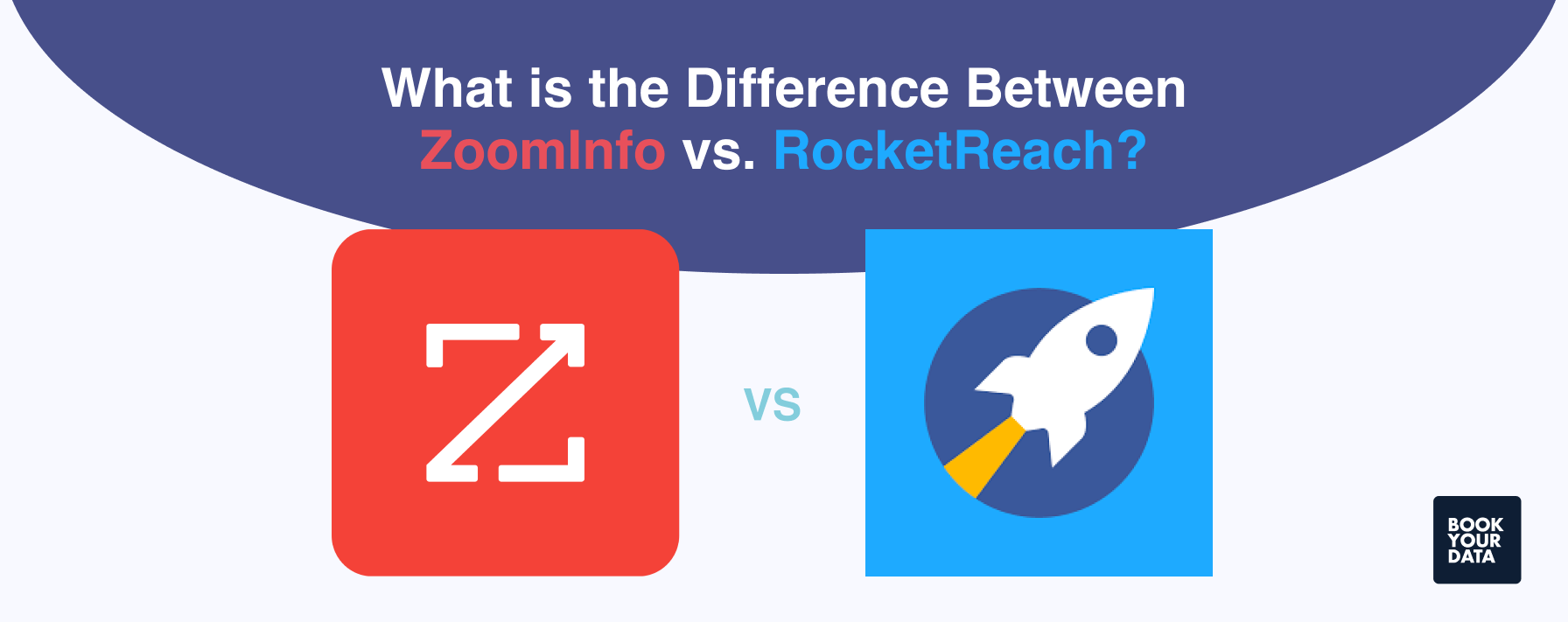
The differences between ZoomInfo and RocketReach include data depth, pricing, data accuracy, integrations, search capabilities, user experience, and use cases.
The differences between ZoomInfo and RocketReach are mentioned below.
- Data depth: ZoomInfo has a vast database with over 260 million individual profiles and 100 million company profiles enriched with firmographic, technographic, and intent data. This tool is ideal for enterprise-level market research and account-based sales. RocketReach covers over 700 million professionals across 35 million companies, but its data focuses more on contact details like emails and phone numbers, with less advanced company insights.
- Pricing: RocketReach is generally more affordable and provides tiered pricing suitable for small businesses and individuals. ZoomInfo operates on a subscription model with higher pricing and targets larger organizations with custom pricing according to their lead generation requirements.
- Data accuracy: ZoomInfo uses a combination of AI and human verification to maintain accurate, real-time data with advanced intent signals and account-level intelligence. RocketReach provides verified contact details, especially email accuracy, but may lack depth in company-level insights.
- Integrations: ZoomInfo offers integrations with different CRMs, two-way sync, and real-time data updates, so it is suitable for businesses with complex sales workflows. RocketReach offers fewer integrations and simpler syncing options, which are more suitable for individual users or smaller teams.
- Search capabilities: ZoomInfo supports advanced filtering, intent-based search, and organizational charts, which are valuable for strategic sales and marketing. RocketReach provides an intuitive search interface with Boolean support and focuses mainly on discovering direct contact information.
- User experience: ZoomInfo has a steeper learning curve but offers comprehensive features for enterprise-level sales and marketing teams. RocketReach is user-friendly and best suited for individual contributors, founders, and small teams conducting manual outreach.
- Use cases: ZoomInfo is ideal for large sales teams, marketers, and recruiters who need extensive B2B data and automation. RocketReach serves individuals, startups, and small teams looking for direct contact discovery and recruiting on a smaller scale.
What are the use cases of ZoomInfo?
The use cases of ZoomInfo are technology companies, financial services firms, marketing and sales teams at companies, sports and entertainment organizations, and sales and marketing agencies.
The top use cases of ZoomInfo are mentioned below.
- Technology companies: ZoomInfo helps technology firms identify potential customers, track new market trends, and understand technology adoption across industries through its extensive technographic data. This tool also helps technology companies target prospects with customized messaging and prioritize high-value prospects.
- Financial services firms: Financial services firms use ZoomInfo to find decision-makers, track market changes, and gain information about company financial health and funding rounds. This GTM tool helps financial services firms gain clients using accurate and real-time data.
- Marketing and sales teams at companies: Marketing and sales teams at companies use ZoomInfo to build prioritized lead lists, automate outreach processes, and access buyer intent signals to make their marketing campaigns more successful.
- Partner relationship management companies: Partner relationship management companies use ZoomInfo for better partner targeting, data-driven ABM (Account-Based Marketing), and joint go-to-market strategies with accurate contact and firmographic intelligence.
- Enterprise SaaS firms: Enterprise SaaS firms use ZoomInfo to maximize their sales, marketing, and customer acquisition by using its large B2B contact data, intent signals, and sales intelligence tools.
- Sports and entertainment organizations: Sports and entertainment organizations use ZoomInfo to identify and reach corporate sponsors, partners, and important stakeholders. It allows users to access real-time company data, identify decision-makers, prioritize accounts, personalize outreach, and find new market opportunities.
- Sales and marketing agencies: Sales and marketing agencies use ZoomInfo to access automation features to optimize client lead generation campaigns and improve account targeting.
What are the use cases of RocketReach?
The use cases of RocketReach are sales, marketing, recruiting, and healthcare. Each of them uses RocketReach for different purposes.
The use cases of RocketReach are mentioned below.
- Sales: Sales managers use RocketReach to create targeted sales prospecting strategies to identify and engage with qualified leads using accurate, up-to-date phone numbers, emails, and social media links.
- Marketing: Marketing personnel use RocketReach to access up-to-date email and phone contacts, which improve campaign targeting and engagement. The platform supports multi-channel outreach by connecting marketers to the right audience.
- Recruiting: RocketReach helps recruiting teams identify and reach qualified candidates quickly instead of using the slow and traditional recruiting methods. It provides direct contact details that improve the hiring process and candidate response rates.
- Healthcare: Healthcare organizations use RocketReach to connect with medical professionals and industry experts for partnerships, recruitment, or outreach. It helps them locate contacts in a highly regulated sector like hospitals, where verified data is necessary.
What are the benefits of ZoomInfo?
The benefits of ZoomInfo are to provide accurate, updated contact data, analyze sales calls for insights, identify website visitors, alert on key prospect actions, integrate with major CRMs, and provide training and support.
The benefits of ZoomInfo are discussed below.
- Provide accurate, updated contact data: ZoomInfo provides accurate and updated contact data of verified companies. This up-to-date data helps sales and marketing teams to work only with reliable information and make their outreach campaigns successful.
- Enable targeted lead generation: ZoomInfo allows targeted lead generation through advanced filters and AI-driven intent data, which helps users identify and prioritize their most promising prospects and make their lead generation efforts a success.
- Boost sales: Sales teams benefit from automated workflows, AI-guided prospect scoring, and real-time account insights that maximize deal progression and increase conversion rates.
- Analyze sales calls for insights: This GTM platform tracks and analyzes customer interactions such as sales calls, which help sales teams understand buyer behavior, customize their message, and improve their sales strategies.
- Identify website visitors: ZoomInfo reveals company details and intent signals from anonymous website traffic. This identification of website visitors allows sales teams to personalize their outreach messages and close deals with engaged prospects.
- Automate outreach and CRM updates: ZoomInfo combines automated outreach by integrating with popular CRMs such as HubSpot and Salesforce to update records and reduce manual tasks for sales teams.
- Alert on key prospect actions: Users use ZoomInfo to receive real-time notifications on important prospect activities like funding events, leadership changes, or increased buyer intent. ZoomInfo helps companies engage with relevant prospects and close their deals quickly.
- Integrate with major CRMs: ZoomInfo smoothly connects with popular CRM and marketing automation platforms such as Zoho and PipeDrive to confirm data consistency and provide sales teams with connected workflows.
- Provide training and support: ZoomInfo contains detailed onboarding and training resources and also provides regular support to help sales teams optimize their outreach efforts.
What are the drawbacks of ZoomInfo?
The drawbacks of ZoomInfo are that it charges high prices with costly add-ons, enforces strict and unclear contracts, requires time to learn due to the complex UI, and misses data on smaller companies.
The drawbacks of ZoomInfo are mentioned below.
- Charge high prices with costly add-ons: ZoomInfo charges high prices starting at $14,995 per year. The platform provides add-ons, such as email verification, intent signals, AI tools, and global data access, which increase the overall cost of the plans.
- Enforce strict and unclear contracts: ZoomInfo typically requires annual contracts with little flexibility for shorter terms or monthly payments. Contracts of ZoomInfo renew automatically every year with 10–20% price increases and sometimes a feature change in between. These changes require users to renegotiate and upgrade their plan.
- Require time to learn due to the complex UI: This B2B prospecting platform’s interface has a complex UI, which requires users to spend time to learn it first before starting to use it for their outreach. New users find it difficult to use the platform because it has complex sales and marketing workflows.
- Offer limited customer support: Many users complain that they do not receive a positive response from the customer support team of ZoomInfo, and no regular support is available.
- Deliver unreliable intent and email data: ZoomInfo users occasionally report inaccuracies in intent data and email addresses, such as outdated contacts or false positive buyer signals. Users also face increased email bounce rates and find it difficult to make their outreach process successful.
- Miss data on smaller companies: ZoomInfo mainly focuses on larger companies and does not provide data for smaller companies or startups. ZoomInfo is not a good choice for companies that plan to target small businesses and startups.
What are the benefits of RocketReach?
The benefits of RocketReach are ease of use, seamless LinkedIn integration, advanced search and filters, saved lists, and responsive support.
The benefits of RocketReach are mentioned below.
- Ease of use: RocketReach has a user-friendly interface that allows users to quickly search, find, and engage with contacts without needing any training. Small businesses and even startups find this tool easy to use for their outreach needs.
- Seamless LinkedIn integration: RocketReach has a Chrome extension that directly integrates with the LinkedIn profile and allows users to instantly access accurate information, such as emails and phone numbers, while browsing their profiles.
- Advanced search and filters: RocketReach provides strong search capabilities with advanced search and filters such as job title, company size, industry, location, and technology stack, which allow precise targeting and lead generation.
- Saved lists: This email and contact finder tool allows users to create, save, and manage custom contact lists within the platform. These saved lists help sales teams organize their outreach campaigns and easily monitor and target their potential prospects.
- Responsive support: The customer support of RocketReach is responsive and helpful, as their support team regularly assists users in overcoming challenges quickly. Their quick support allows sales teams to generate a maximum number of leads.
What are the drawbacks of RocketReach?
The drawbacks of RocketReach are related to pricing concerns, data accuracy issues, limited results, being charged for bad data, and slower data mining.
The drawbacks of RocketReach are mentioned below.
- Pricing concerns: RocketReach paid pricing plans start at $329 billed annually, which is expensive for small businesses. Sales teams need to pay a price per user, and credits used for lookups run out quickly.
- Data accuracy issues: RocketReach claims a 90 to 98% successful delivery for emails, but users report the platform’s outdated or incorrect contact details, such as missing phone numbers and old job titles. These data accuracy issues waste the efforts of the sales team and make the outreach campaigns unsuccessful.
- Limited results: Some users experience limitations in database results due to missing contacts and incomplete profiles, especially for niche industries or international markets. These limited data results make it difficult for businesses to target niche-based companies.
- Charged for bad data: RocketReach’s credit system means users consume credits when finding contact information. These credits are also spent when users find inaccurate and invalid data. Sales teams have to verify the data first and then design their outreach campaigns to avoid paying for inaccurate data.
- Slower data mining: RocketReach’s data updates and mining processes are slower than other enterprise-grade tools, such as BookYourData. This slow and delayed process of data mining provides less up-to-date information and longer waiting times for bulk lookups or data refreshes.
What is ZoomInfo's database quality?
ZoomInfo’s database quality is updated through a multi-source system such as machine learning, third-party partnerships, web crawling, and user contributions. This B2B prospecting tool continuously updates its contact information both through automated processes and manual verification, which minimizes email bounce rates. ZoomInfo’s data accuracy score is 75-99% and it maintains this data accuracy rate by using artificial intelligence to detect duplicates and delete outdated records. This GTM tool also validates email through advanced syntax checks and bounce testing.
What is RocketReach's database quality?
RocketReach’s database quality is highly reliable as this platform regularly updates its database and collects information from company websites, social media, and trusted sources. The users of RocketReach report an 86% or higher fill rate for email addresses and a 60% or higher fill rate for direct phone numbers. They have an average email deliverability rate of 98% for A-grade verified addresses. Their database is also large and constantly updated, with over 85 million profiles refreshed monthly. They maintain this database by using more than a dozen sources, processing new data regularly, and providing it to new users. This B2B platform obtains its data from various sources, such as company websites, organizations, and social profiles. RocketReach uses proprietary algorithms to check the data against a database and confirm that the information is updated. RocketReach uses machine learning and AI solutions to gather data, spot inaccurate or outdated information, and replace it with updated information.
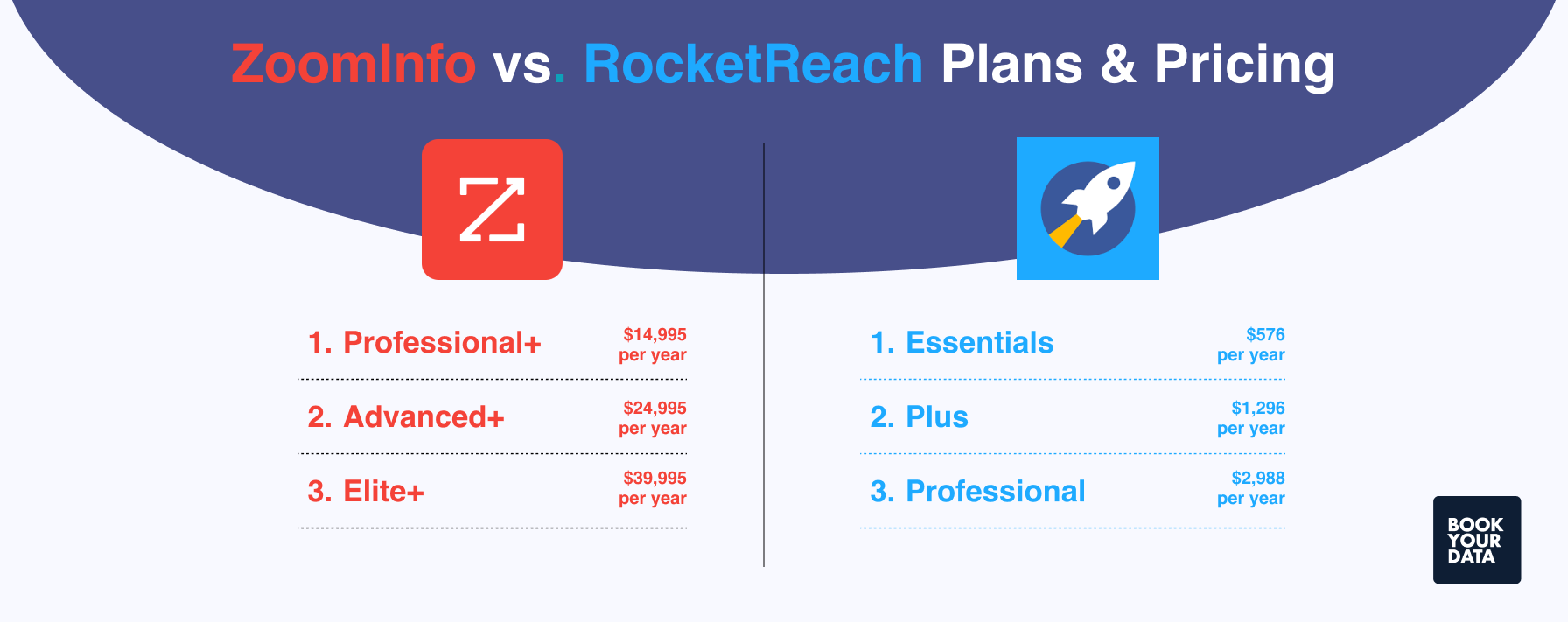
What are the pricing plans of ZoomInfo?
The pricing plans of ZoomInfo are the Lite, Professional, Advanced, and Elite plans. Every plan charges users annually and offers additional features and add-ons.
The ZoomInfo pricing plans are listed below.
- Lite plan: ZoomInfo’s Lite plan costs $0, but allows users to submit a form on their website and access features, such as contact and company search. This plan is suitable for small teams that want to test the features of the platform before committing to a paid plan.
- Professional plan: ZoomInfo’s Professional plan costs $14,995 per year and provides 5000 annual bulk credits. This plan allows sales teams to add additional users, but each additional user costs $1,500, and discounts apply when there are more than 20 users.
- Advanced plan: ZoomInfo’s Advanced plan costs $24,995 annually and contains 10,000 bulk credits per year. The larger groups need to pay $2,500 per user, and extra-large groups get discounts from ZoomInfo.
- Elite plan: ZoomInfo’s Elite plan costs $39,995 per year, and each user gets access to 1000 monthly credits. Users who need several features and add-ons need to buy an annual subscription to the Elite plan.
What are the pricing plans of RocketReach?
The pricing plans of RocketReach are Free, Essentials, Pro, and Ultimate. RocketReach offers flexibility to users in each subscription plan, either monthly or annually.
The RocketReach pricing plans are listed below.
- Free: The Free plan of RocketReach offers 5 free lookups and requires no credit card. RocketReach's free plan allows users to upgrade whenever they want and to downgrade or cancel anytime.
- Essentials: The Essentials plan of RocketReach offers unlimited personal and professional emails for $69 per month. RocketReach users can send 500 emails per day if they subscribe to the annual plan.
- Pro: The Pro plan of RocketReach offers unlimited mobile and direct phone numbers and smoothly integrates with CRMs such as HubSpot, Salesforce, Bullhorn, Salesloft, and Outreach. RocketReach Pro plan costs $119 monthly and allows sales teams to access technographics, news, and organizational charts.
- Ultimate: The Ultimate plan of RocketReach offers intent data and custom mapping with CRMs like Salesforce. RocketReach’s Ultimate plan costs $209 per month and allows users to export 20,000 contact data annually.
What is the best alternative to ZoomInfo and RocketReach?

BookYourData is the best alternative to ZoomInfo and RocketReach since it is a B2B intelligence platform that provides real-time verified contact information with a 97% accuracy guarantee. This ZoomInfo competitor allows businesses to filter and target their prospect companies using more than 100 filters. BookYourData allows users to find email addresses of companies through the company’s name or URL. BookYourData is one of those RocketReach alternatives that uses a triple-verified data process, like automated verification, manual research, and then AI-driven validation to provide accurate data. BookYourData credits never expire and contain a pay-as-you-go model, which requires no annual subscriptions or long-term contracts.
G2 comparison for BookYourData, RocketReach, and Zoominfo
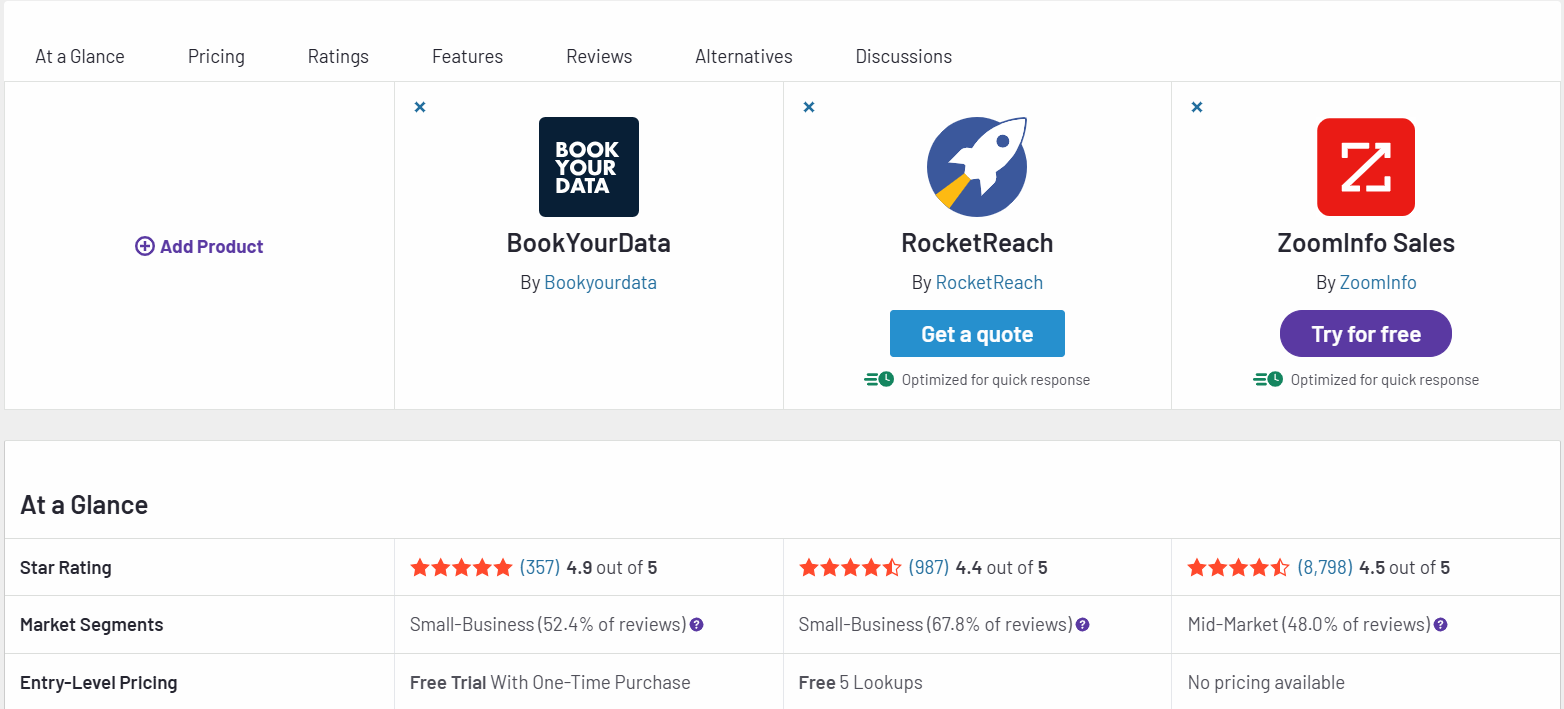
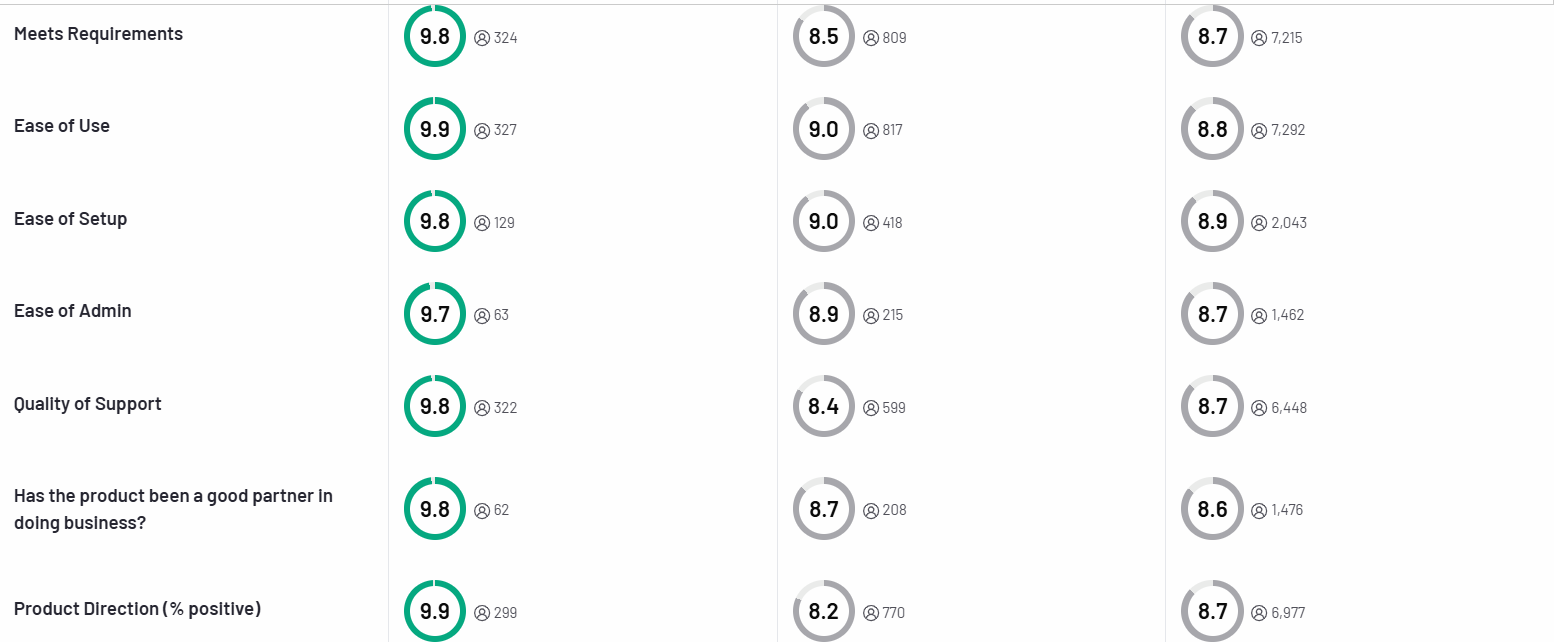
Source: https://www.g2.com/compare/bookyourdata-vs-rocketreach-vs-zoominfo-sales
BookYourData is an excellent B2B data provider for businesses since it contains data of 250 million business contacts across 200+ countries. It has a user-friendly interface that helps sales teams build lists and manage data easily. It serves over 200,000 users globally and allows businesses to build targeted lists and reach out to prospects with customized pitches. This B2B prospecting tool guarantees 97% data accuracy and has a customer support team that offers 24/7 support to resolve the queries and concerns of users.
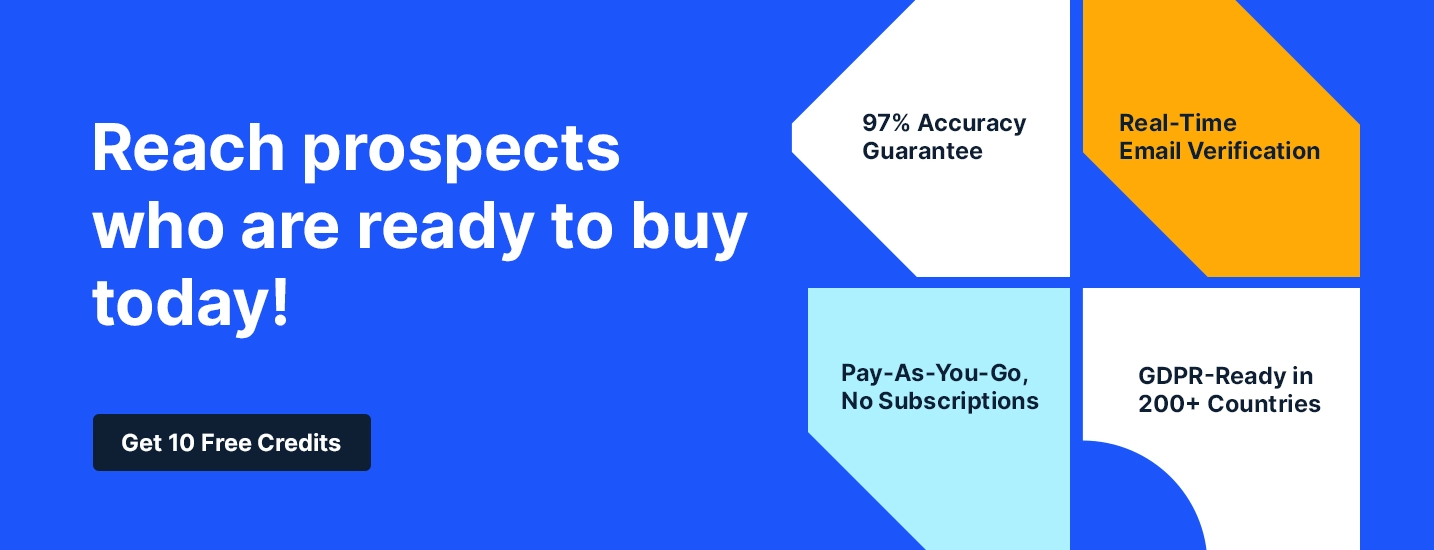
Which is better for B2B sales: ZoomInfo or RocketReach?
ZoomInfo is better for B2B sales if you have a larger sales team or an enterprise that requires a data-rich platform with advanced features, such as building dynamic lists. This B2B tool provides deep company and contact intelligence enriched with firmographic, technographic, and intent data that help in account-based selling and strategic targeting.
RocketReach is better for B2B sales if you have a small team or are an individual user who needs quick and affordable access to verified contact information. It provides a simple, easy-to-use platform and delivers accurate emails and direct dials to support personalized outreach.
Do both ZoomInfo and RocketReach have Chrome extensions?
Yes, both ZoomInfo and RocketReach have Chrome extensions that allow users to find and access contact information directly from their web browser while searching prospects from platforms like LinkedIn. The ZoomInfo and RocketReach Chrome extensions helps sales teams to get verified data and personalize their outreach process and messaging.
How does RocketReach provide B2B intent data for B2B lead generation?
RocketReach provides B2B intent data for B2B lead generation by sourcing data from public databases, company websites, social media profiles, and proprietary data partnerships for building its extensive B2B database. Users search for leads on the platform by company name or job title and then export those details into their CRMs, such as HubSpot and Salesforce.
Is RocketReach good for individual practitioners or small teams?
Yes, RocketReach is good for individual practitioners or small teams due to its affordability, simple interface, and straightforward contact finding capabilities. Users who focus on direct outreach to their prospects, have a limited budget, and need accurate data must utilize RocketReach to benefit from its capabilities.
Does RocketReach work for LinkedIn lead generation?
Yes, RocketReach works for LinkedIn lead generation as it offers a browser extension that integrates with LinkedIn and allows users to find contact details, such as verified emails, phone numbers, and job details, directly from LinkedIn profiles. RocketReach supports automation workflows through Zapier integrations to automate actions such as sending LinkedIn connection requests or enriching LinkedIn lead lists.
Does RocketReach use AI for lead generation?
Yes, RocketReach uses AI for lead generation as it uses advanced algorithms and AI-powered features to automate prospecting, lead enrichment, and outreach processes. It provides AI-recommended qualified leads based on target companies and helps users build targeted prospect lists using advanced filtering options.
Can RocketReach improve cold email success rates?
Yes, RocketReach can improve cold email success rates as it provides accurate contact and email data to minimize bounce rates and confirms email deliverability to the right prospect. It also saves the time of sales teams and allows them to make their cold email campaigns successful.
Can RocketReach integrate with Salesforce?
Yes, RocketReach can integrate with Salesforce as it allows users to automatically sync data from RocketReach into Salesforce as new leads, contacts, or accounts. This includes exporting verified contact information, such as emails and phone numbers, directly into Salesforce, which helps keep CRM data up-to-date.
Which platform offers better data accuracy and sales insights: ZoomInfo or Cognism?
Cognism is the platform that offers better data accuracy with a 90+% match rate by maintaining GDPR compliance and providing phone-verified mobile numbers. ZoomInfo provides extensive U.S. data coverage and AI-powered data, but has a lower data accuracy rate of around 75%. Users prefer Cognism over ZoomInfo when they have a low budget and need more advanced filtering options.
How do BookYourData and ZoomInfo compare in delivering high-quality B2B contact data?
BookYourData and ZoomInfo compare in delivering high-quality B2B contact data, as BookYourData provides real-time data at a lower price, while ZoomInfo provides 75-99% data accuracy in high pricing tiers. The main difference between BookYourData and ZoomInfo is that BookYourData offers to build targeted B2B email lists by using over 100 filters, while ZoomInfo does not provide any specific filtering options.
How do Seamless.ai and ZoomInfo support B2B sales prospecting differently?
Seamless.ai and ZoomInfo support B2B sales prospecting differently, as Seamless.ai uses artificial intelligence for verifying leads, while ZoomInfo uses B2B sales prospecting software to increase businesses' pipeline and revenue. The main difference between Seamless.AI and ZoomInfo is that ZoomInfo gathers data through various resources and uses AI to customize messaging, while Seamless.AI generates AI-powered, real-time contact lists for quick outreach.
How do Lusha and ZoomInfo enhance data accuracy for sales and marketing teams?
Lusha and ZoomInfo enhance data accuracy for sales and marketing teams as Lusha combines AI and machine learning to update its contact database monthly, while ZoomInfo uses APIs, real-time webhooks, and a dedicated research team to provide accurate data.
[CTA1]
[CTA2]











